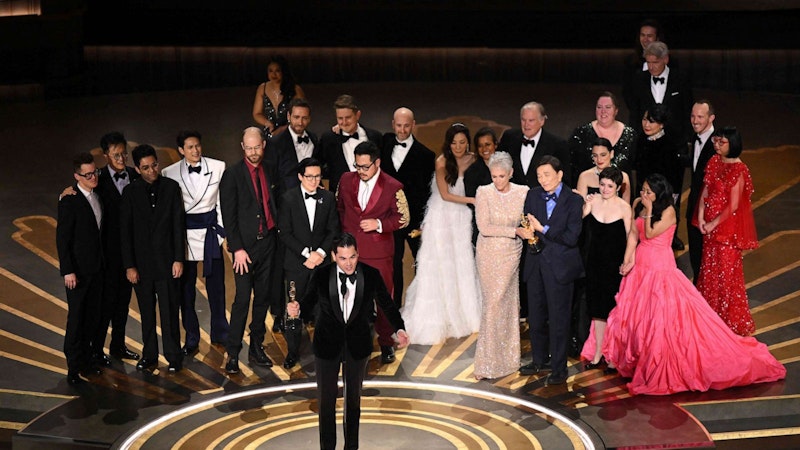Although I didn’t watch them—I really wish they were watchable—2023 Oscars was the first ceremony that didn’t feel like a mulligan, a qualified and “scaled back” presentation before the pandemic had ebbed to wherever it’s at now (over?). In 2020, Parasite won Best Picture over Once Upon a Time in Hollywood, and Bong Joon-ho won over Quentin Tarantino, for the same films. Say what you will about the Daniels and Todd Field in comparison, but they did make real movies that real people saw in real theaters this year—last year.
(Whenever “Oscar reformations” are brought up, no one talks about the timeline. Shouldn’t the ceremony be held earlier in February or January? And shouldn’t it once again embrace its nakedly political and local status? Paul Schrader said the other day, via Facebook, that the Oscars shouldn’t be an “International Festival”—he’s right that the French have the Cesars, the British have the BAFTAs, and so on.)
On the night of the Oscars, I knew Everything Everywhere All at Once was going to sweep (I missed Jamie Lee Curtis, thinking Kerry Condon would get the sole award for The Banshees of Inisherin). In a pre-2020 ceremony, Tár would’ve won Best Director, Best Actress, or Best Picture, or all three. The voting pool has made the past four ceremonies noticeably more dull and far more predictable. There is no more silent majority that will give Green Book Best Picture, or Moonlight anything but a full sweep—can you imagine La La Land winning any awards against that movie today? The only reason I know things have changed is because I’ve always bet money on the Oscars, and it’s been getting easier.
I didn’t like EEAAO, but its sweep isn’t the bleak death knell for theatrical cinema that I felt when CODA won last year. The resurrection of theatrical moviegoing in America allows more windows and mirrors onto an audience of increasingly middle-aged millennials who’ll want to see more of this kind of hyper-kinetic, cute, kind, non-confrontational, and cathartic cinema in the future. Or they’ll want something just as crazy in another direction.
Even though they were posed as rivals, Tár isn’t the opposite of EEAAO. As much as I love it, it’s a prestige movie that belongs to another time, pre-pandemic, a serious movie for adults about the adult world, ambiguous and ambivalent, with a lifetime performance by Cate Blanchett and invigorating direction by Todd Field. Tár might be the best “Oscar movie” of my life, despite winning zero Oscars. Just a few years ago, this movie would’ve swept every category, but they came up against an original indie movie with an epic scope made on a relatively small budget that brought many people back to movie theaters for the first time since the start of the pandemic. Tár wasn’t seen in movie theaters, even though it’s just as much a topic of conversation as any Oscar movie would’ve been 10, 20, 30 years ago. The audience for Tár watched it home, mostly. It only made $5 million against a $55 million budget. How is this sustainable?
An anonymous Academy voter told Yahoo News, “I hated the one that’s going to win, Everything Everywhere All at Once. I’ve had many friends say, 'It’s a stoner movie!’ Well, I’m a stoner, and I couldn’t enjoy it. I had to start it four times; the fourth time, I finally made it through the whole thing. It’s just so nonsensical and convoluted. I heard somebody in an interview call it ‘a lesbian Fantasia’—where the fuck does that come from? There was only one thing I enjoyed in the movie, and that was Jamie Lee Curtis.” After three years of Cinema Dark Ages, I can only hate a movie so much if it brought people back to theaters after the pandemic, and even though I didn’t like it, EEAAO is a real movie that real people saw in real movie theaters. I don’t care about the Oscars, but the ceremony is always a check on the pulse of the medium, and judging by this one, it’s not dead yet.
—Follow Nicky Smith on Twitter: @nickyotissmith

